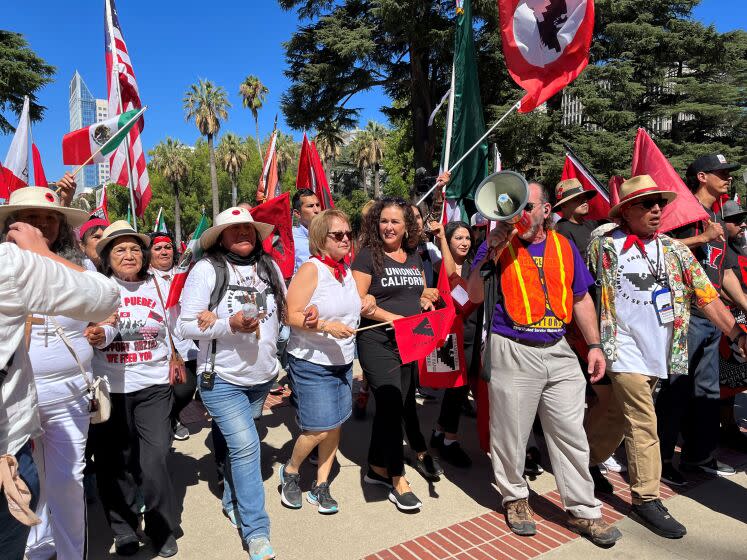Column: Farmworkers didn't get what they wanted from Newsom — this time

- Oops!Something went wrong.Please try again later.
- Oops!Something went wrong.Please try again later.
- Oops!Something went wrong.Please try again later.
It was California Farm Worker Appreciation Day, and the farm laborers and their supporters arriving at the state Capitol were disappointed but not defeated — pretty much summing up 60 years of history for the struggling union that represents them.
Thousands showed up. They came in roller skates and strollers, burning copal incense to cleanse weary spirits, chanting the "Sí se puedé" slogan Dolores Huerta coined and Cesar Chavez made famous.
But they also came Friday knowing they were unlikely to win what they are after: the governor's signature on a controversial bill.
"This march is not in vain," Huerta, now 92, told the crowd as she tried to keep the energy positive. But it looks as though it might be.
The gathering on the Capitol steps was the end of a 335-mile march through the August heat of the Central Valley in support of a measure that would change the rules for how their union elections are held — Assembly Bill 2183 — but which Gov. Gavin Newsom has indicated he will veto, though insiders hint there's still room for a last-minute miracle.
The fate of that legislation aside, it was hard to be in that crowd without feeling the history — all that's the same and all that has changed for the vulnerable workers in California fields.
When Huerta began this journey in her 20s, farmworkers had no voice, and certainly no power. They felt invisible, she said, and in the rooms where decisions are made, they were.
Many of the workers themselves are still in that position today. We still shamefully exploit them — during the pandemic, in a summer thick with wildfire smoke, I spent some time with farmworkers in Stockton who were being evicted, despite rules that should have protected them, despite continuing to show up for work every day in that foul air, thick with pollution and COVID-19.
Even when we promise to do better, we don't.
But their children are living different lives, and the legacy of first-generation UFW members, and all those who worked in our fields back then, is now a present tense of second and third generations wielding the power their parents dreamed of, and fought for.
Take state Sen. María Elena Durazo, who hails from Los Angeles and is the daughter of farmworkers. Or California Federation of Labor leader Lorena Gonzalez, whose dad picked strawberries.
Or everyday people like Rachel Ricketts, who pushed her 7-month-old daughter in a stroller while Joaquin, her 8-year-old son, held a poster urging Newsom to sign. Ricketts' grandfather was a farmworker. She runs a vintage boutique.
"I wasn't going to stay home for this," she said. And neither were her kids. They'll grow up as a third generation who knows their roots.
That's power you can't undo, and can't ignore.
Durazo made the point when she roared from stage that farmworkers "are fighting for the dignity of all workers. They are fighting for the dignity of the Latino community."
Nearly 40% of Californians are Hispanic or Latino, though they make up only about 20% of the electorate. They are majorities in 11 counties, mostly in the Central Valley, and are becoming more politically relevant every day.
As political consultant Mike Madrid puts it, "it's a critical constituency for Democrats considering we are younger, working class and shifting rightward."
And though the diversity in the Latino population means more often than not, they have no direct ties to farmworkers, "there's a cultural soft spot for farmworkers that symbolizes a politician's regard for the community," Madrid said.
But Thursday evening, as the marchers made the final leg of their pilgrimage, Newsom made it clear he's not ready to put his signature on it, despite the resounding "sign the bill" chants that rang out Friday afternoon.
My colleagues Jessica Garrison and Fidel Martinez have both written about that grueling journey, which re-created a famous one led by Chavez in 1966, and the legislation — and the rounds of backroom negotiations that may or may not be ongoing, depending on whom you ask.
The point of contention between the union and the governor is who should decide when a workplace is hostile enough to change how potential members register their support for joining a union — the government or the union — and how to handle the chain of custody for ballots. Newsom argues the Agricultural Labor Relations Board should have the authority, but the union doesn't trust it not to side with growers.
As UFW President Teresa Romero has argued for months, it's about protecting workers who may be undocumented or fearful from "intimidation and deportation."
Newsom's team worries that, as written, the ballots wouldn't be secret and wants the ALRB to be in control of the process.
Newsom's communications director Erin Mellon said in a statement that the governor is "eager to sign legislation that expands opportunity for agricultural workers to come together and be represented, and he supports changes to state law to make it easier for these workers to organize."
But.
"We cannot support an untested mail-in election process that lacks critical provisions to protect the integrity of the election, and is predicated on an assumption that government cannot effectively enforce laws," Mellon continued.
So no compromise and no signature for now, blistered feet or not.
Where does that leave the farmworkers?
Likely pushed into another legislative season but still working on it. Disappointed but not defeated. Powerful but not powerful enough.
Yet.
This story originally appeared in Los Angeles Times.

